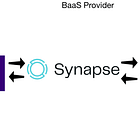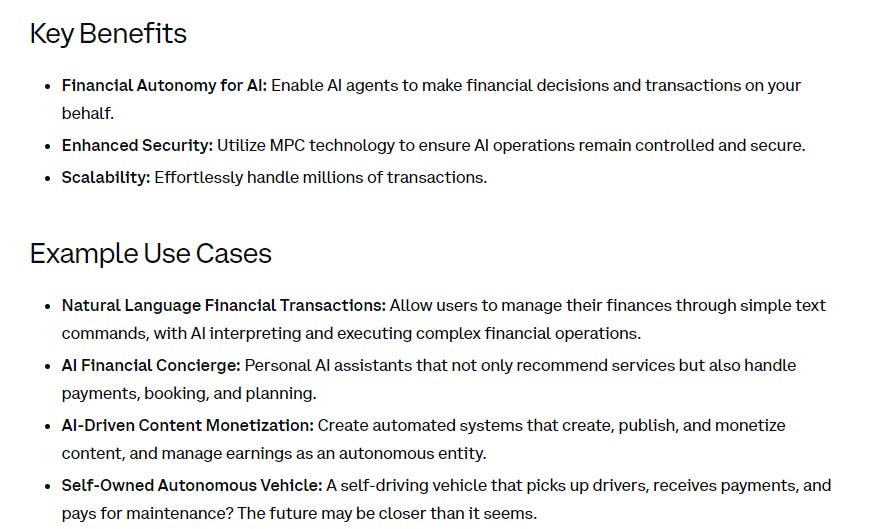Analysis: Stripe and Coinbase embrace Generative AI + our AI investment index
Generative AI and blockchain are merging to reshape the financial landscape
Gm Fintech Architects —
Today we are diving into the following topics:
Summary: We discuss how fintech firms like Stripe and Coinbase are positioning themselves to leverage Generative AI and blockchain technology. Stripe is partnering with leading AI companies, like OpenAI, for payment processing while also using AI to enhance fraud detection and improve user experiences. Coinbase is building blockchain-based financial infrastructure to support AI agents, focusing on digital wallets and decentralized finance as traditional systems may not meet AI’s evolving needs. We explore the potential transition from centralized AI models to decentralized frameworks where blockchain intersects with AI, and provide a quantitative update on our Western, Eastern and Decentralized AI investment index.
Topics: Stripe, OpenAI, Perplexity, Anthropic, Coinbase, NVIDIA, Generative Ventures, Apple, Salesforce, Coreweave, Lambda Labs, Exabits, Exo Labs, Akash, Render, IO.net, Bittensor, Morpheus, Hyperspace, Sentient, ASI, Gaianet, Ritual, Lex, Heygen, Meta, Alibaba, Sensetime, CloudWalk, Near.
To support this writing and access our full archive of newsletters, analyses, and guides to building in the Fintech & DeFi industries, see subscription options below.
Synapse Conversation Takeaways
Before jumping into the main topic today, we want to highlight again the key takeaways from our conversation with Sankaet, former CEO and Founder of Synapse. If anyone needs to listen to a pitch for unified banking ledgers and easier access to Fed accounts, this is it.
We recommend you review the entire conversation here.
Integration Issues with Core Banking Systems: Synapse’s reliance on traditional core banking systems like Jack Henry, FIS, and Fiserv led to frequent issues in transaction reporting. Data transfers through these systems were prone to errors, with missing or delayed payment files that disrupted Synapse’s ability to track transactions in real-time.
Evolve Bank's Payment File Discrepancies: Synapse experienced significant breaks in transaction data with Evolve Bank, where payments like $50 deposits or debit instructions did not consistently appear in the payment files. These discrepancies were often discovered only after customers reported missing funds, revealing a critical flaw in Synapse’s ability to reconcile data accurately.
Magnitude of Missing Funds: The financial discrepancies associated with Evolve led to approximately $90 million in missing funds, including $12 million linked to improper debits, $14 million in issues related to TabaPay offsets, $40 million connected to Mercury migrations, and around $5 million involving wire transfers.
Over-Reliance on Evolve Bank: Evolve Bank became the dominant partner for Synapse, handling the majority of its transaction processing and financial services. This concentration of business meant that any issues with Evolve’s data handling, particularly through its core system Jack Henry, had a disproportionately large impact on Synapse’s overall operations.
Unauthorized Fee Deductions: Evolve Bank instructed TabaPay to debit fees directly from customer pooled accounts (FBO accounts) rather than from Synapse's operating accounts, leading to significant unauthorized deductions. This approach resulted in double billing for some fees, where Synapse was invoiced by Evolve while TabaPay simultaneously withdrew from customer funds.
Mercury Account Migration Issues: During the transition of Mercury’s accounts, Synapse discovered that $49 million was improperly moved due to inaccurate balances in the FBO accounts at Evolve. This mismanagement occurred because Mercury had unrestricted access to its own segregated account, leading to excess funds being transferred without oversight.
Financial Collapse Triggered by Evolve's Actions: In late 2023, Evolve withheld $50 million from Synapse following the detection of ledger inconsistencies. This action led to a rapid financial decline, cutting Synapse’s revenue in half, triggering layoffs, and ultimately leading to a distressed sale to TabaPay, with Synapse’s valuation falling drastically from its earlier $2.5 billion peak.
We asked Sankaet about lessons learned, and challenged him on the profound impact of the company’s collapse on the BaaS industry. Here is a summary of his answers —
Independent Reconciliation: Sankaet realized the need for independent reconciliation processes, advocating for direct data feeds from the Federal Reserve to bypass flawed intermediary systems. Relying on bank partners for transaction data proved to be a critical error.
Diversify Banking Partners: Over-reliance on Evolve Bank became a major vulnerability. Sankaet recognized the importance of spreading risk by engaging multiple banking partners to mitigate operational disruptions.
Cautious Scaling: Scaling on unstable technology created significant risks. Sankaet noted that halting growth until core issues were resolved would have prevented compounding problems later.
Regulatory Gaps: Sankaet identified insufficient oversight in bank reconciliation as a core issue. He pushed for mandatory daily reconciliations by banks and advocated for fintechs to have direct access to payment networks through regulatory channels.
User Impact Awareness: The disruptions caused by financial errors had a direct effect on end-users, particularly those underserved by traditional banks. Sankaet highlighted the need to prioritize customer stability in fintech operations.
Long Take
AI Commerce Liftoff
We are seeing a few bits of evidence that large fintech firms are recognizing the value shift coming from Generative AI, and starting to prepare for it.
Here is Stripe talking about having 80%+ of the top AI companies as clients for payment processing.
Top companies like OpenAI, Perplexity, and Anthropic all benefit from usage-based billing tied to inference costs. It is no surprise that most Web2 AI businesses will choose Stripe as their integration partner. Similarly, there are tremendous opportunities for Stripe. If they take anywhere close to a 3% fee, OpenAI’s $4 billion of revenue alone would generate $120MM of fees for the payment processor.
In the other direction, Stripe is integrating increasingly more AI to deal with payment fraud, increasing conversions for checkout, and optimizing the user experience.
The company has just announced a deeper relationship with NVIDIA, which we interpret as having premier access to GPU and advanced models. That’s about $1 trillion of payments volume flowing through NVIDIA inference.
In another recent example, Coinbase is building out onchain financial infrastructure for AI agents.
The core premise is the same as the investment thesis for our venture fund, Generative Ventures. As increasingly more labor is generated by machines, that labor will be digital and shift to blockchain-based ownership and economic structures. AI agents will need bank accounts and payment rails, but will find that traditional financial institutions and various fintech compromises are not all fit for purpose. Rather, they will control digital wallets and access a variety of decentralized finance protocols for commerce.
We are impressed that Coinbase is already moving in this direction. Of course, they are motivated by several catalysts. First, they own a protocol called Base, which earns them millions in gas fees from transactions. Second, they have a crypto payment processing capability. Third, the company’s smart wallet solution requires users — whether human or machine. And last, Coinbase has an interest in promoting USDC as stablecoin for payment. Still, the company is clearly experimenting along the frontier.
We highlight these examples to show how such themes are already making inroads at companies like Stripe and Coinbase.
But there is much more to come.







